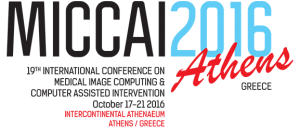News:
- Special issue was published in Computerized Medical Imaging and Graphics.
- All accepted papers was published in LNCS: https://link.springer.com/book/10.1007/978-3-319-47157-0.
- All accepted papers are invited to submit to Special Issue on Machine Learning in Medical Imaging (Submission Guideline: To submit for the special issue Machine Learning in Medical Imaging, please select the article type “VSI:MLMI”).
- NVIDIA Best Paper Award winner: Polina Biner, Nematollah Batmanghelich, Raul San José Estepar, and Polina Golland, “Unsupervised Discovery of Emphysema Subtypes in a Large Clinical Cohort”
- Best Reviewer Award winner: Prof. Ghassan Hamarneh
Overview
Machine learning plays an essential role in the medical imaging field, including computer-aided diagnosis, image segmentation, image registration, image fusion, image-guided therapy, image annotation and image database retrieval. Machine Learning in Medical Imaging (MLMI 2016) is the seventh in a series of workshops on this topic in conjunction with MICCAI 2016. This workshop focuses on major trends and challenges in this area, and it presents work aimed to identify new cutting-edge techniques and their use in medical imaging.
- Accepted papers will be published in LNCS proceeding and will be invited to submit to a special issue of a top-rated journal.
- This year NVIDIA will sponsor a GPU to the winner of the best paper!
- NVIDIA Best Paper Award will be presented to the best overall scientific paper.
Objective
Our goal is to help advance the scientific research within the broad field of machine learning in medical imaging. The technical program will consist of previously unpublished, contributed, and invited papers. We are looking for original, high-quality submissions on innovative research and development in the analysis of medical image data using machine learning techniques.
Topics
Topics of interests include but are not limited to machine learning methods (e.g., deep learning, support vector machines, statistical methods, manifold-space-based methods, artificial neural networks, extreme learning machines) with their applications to the following areas:
- Medical image analysis (e.g., pattern recognition, classification, segmentation, registration) of anatomical structures and lesions
- Computer-aided detection/diagnosis (e.g., for lung cancer, prostate cancer, breast cancer, colon cancer, brain diseases, liver cancer, acute disease, chronic disease, osteoporosis)
- Multi-modality fusion (e.g., MRI/PET, PET/CT, projection X-ray/CT, X-ray/ultrasound) for diagnosis, image analysis and image guided interventions
- Image reconstruction (e.g., expectation maximization (EM) algorithm, statistical methods, iterative reconstruction) for medical imaging (e.g., CT, PET, MRI, X-ray)
- Image retrieval (e.g., context-based retrieval, lesion similarity)
- Cellular image analysis (e.g., genotype, phenotype, classification, identification, cell tracking)
- Molecular/pathologic image analysis (e.g., PET, digital pathology)
- Dynamic, functional, physiologic, and anatomic imaging


